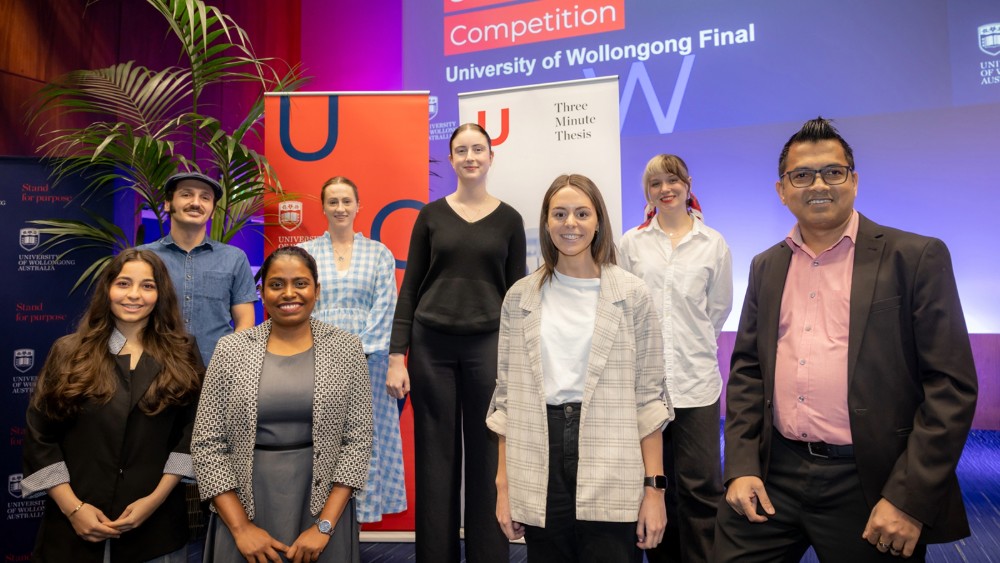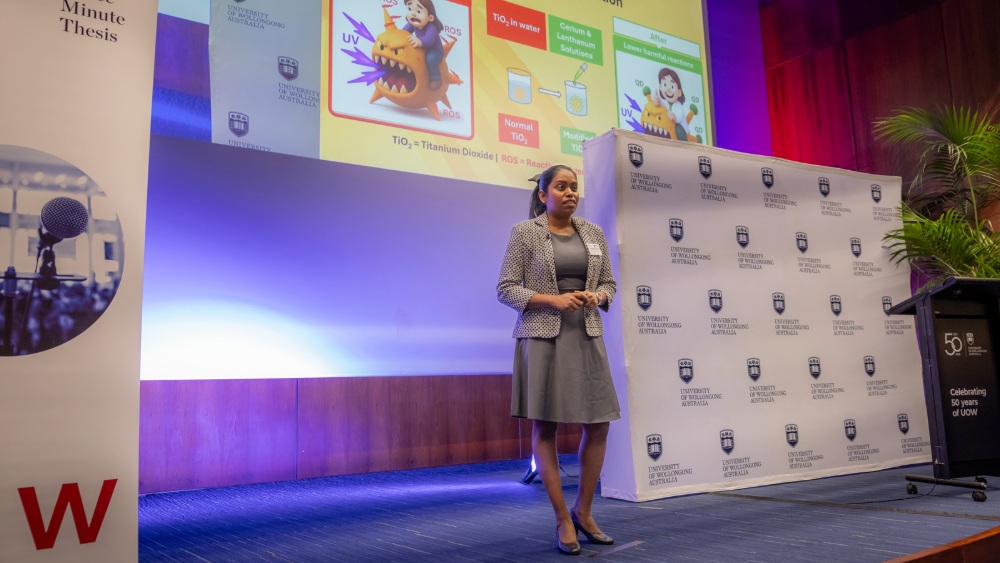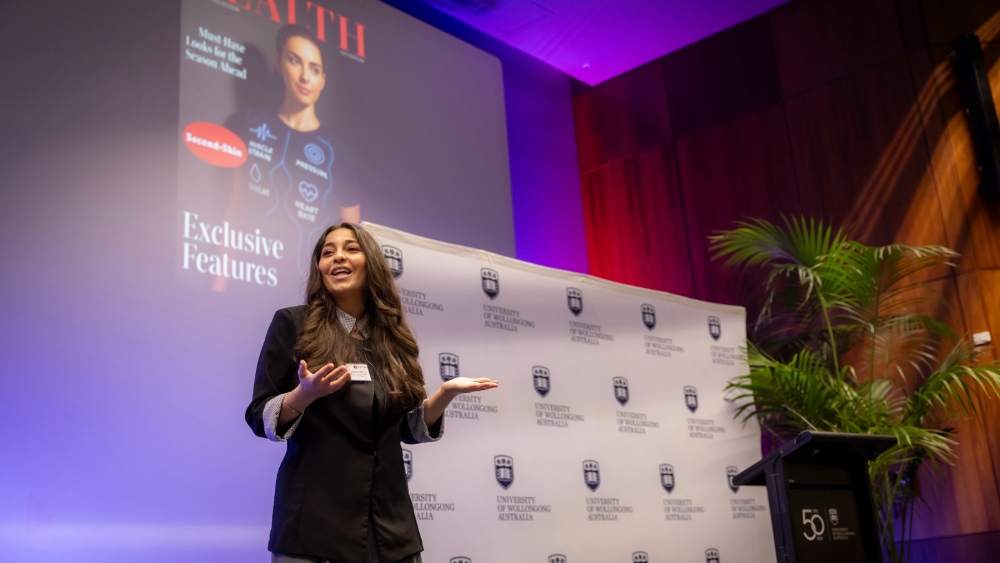Finding your graduate research topic
How nine PhD candidates found inspiration for their theses
September 12, 2025
Whether higher degree research is a lifelong dream or something you never knew was an option, inspiration for a topic of study can come from many sources.
At any given moment across the University of ÌìÃÀ´«Ã½app (ÌìÃÀ´«Ã½app), there are hundreds of higher degree research (HDR) students diligently collecting and analysing information as they work towards their master’s or PhD. With more than 1,400 current HDR students at ÌìÃÀ´«Ã½app, the breadth of topics being studied reflects the cohort.
Earlier this year, nine of those PhD candidates competed in the , which challenged them to present their research in just three minutes, to a non-specialist audience. The presentations covered a diverse range of interests.
If you’ve considered stepping into the world of HDR but don’t know what you’d study, or maybe you have a passion for something but don’t know if it has legs as a PhD, you’re not alone.
To help you get inspired, we asked this year’s 3MT finalists how they got to this point.

Be curious
Nuwangi Cooray – winner of this year’s ÌìÃÀ´«Ã½app 3MT final and the people’s choice award – has always had a curious mind and was drawn to science from a young age, yet she was unaware of what higher degree research meant.
“As the first in my family to do a degree, let alone a PhD,” she says. “I believe my interest in solving practical problems and my resilience paved the path for me to where I am now. As I gained a deeper understanding of research, I continued to be motivated to investigate and learn more.”
Nuwangi’s work focuses on developing safer and more effective sunscreens, though she admits sunscreens weren’t on her radar until she came to Australia.
“During my undergraduate studies in Sri Lanka, I utilised the facilities available to me and conducted research in the electronics field. But deep down, I was always drawn to the physics behind optics and the interaction of light with materials.”
When she was searching for HDR opportunities, Nuwangi found ÌìÃÀ´«Ã½app’s Institute for Superconducting and Electronic Materials. After assessing sunscreens using the UV index for her master’s research and finding discrepancies in performance, she was inspired to dig deeper.
“Skin cancer is a topic that touches millions of people’s lives. Being a part of the solution for skin cancer prevention drives me every day.”

Try something new
For many, it takes a taste of research to spark an interest.
Sarah Cameron found enjoyment in a neuroscience subject and then a research project in the third year of her undergraduate degree.
“It was the first time I was exposed to research,” she says. “I really loved the collaborative environment.”
Now, Sarah is exploring the molecular mechanisms underlying mental health disorders. Her PhD focuses on a small brain region called the habenula, which is often referred to as the disappointment centre of the brain, and how its hyperactivity may contribute to depression.
“I’ve always been drawn to psychiatric research, particularly depression, because it affects so many people yet remains poorly understood. Treatments have advanced little in recent decades. I wanted to understand why some people don’t respond to current treatments and how we can move toward more targeted approaches.”
Follow your hobbies
Your research doesn’t need to solve a life-threatening health science question. Many people don’t realise that their hobbies can lay the groundwork for a worthwhile and in-depth research project.
No matter how frivolous your interests may seem, they just might be the key.
For Lucy Rouse, it was the exclusion of certain topics from traditional literary discussion, or the perception of some forms of media as “low brow”, that was worthy of further study.
“I have always been fascinated by genres and mediums that might be excluded from traditional literary discussion,” Lucy explains. “Funnily enough, these genres and mediums are usually those enjoyed by teenage girls, which highlights a bigger problem in the way wider culture perceives young people and their interests.”
“My research explores how digital media has changed reading practice, particularly in young, predominantly female, romance-reading communities. My thesis addresses the inherent sexism in the low cultural status of underappreciated works, and aims to provide the critical dialogue that they deserve as complex works of literature.”
Look to what’s trending in the news
Second-year PhD candidate Abbey Quintal knew in the early stages of her undergraduate law degree that she was headed towards academia.
“My passion for learning, teaching and critical analysis only grew stronger after tutoring local students at the Woolyungah Indigenous Centre,” Abbey says.
Now, she is working to improve the capacity of Australian post-appeal review pathways to identify and remedy wrongful convictions.
“In the last decade a number of wrongful convictions have been etched into the fabric of the Australian legal system such as Lindy Chamberlain, Andrew Mallard, Kathleen Folbigg and Scott Austic. My commitment to improving access to justice and the lives of disadvantaged wrongfully convicted persons fuelled the early beginnings of my PhD.”
Sina Masourizeyni is also exploring a topical issue: data collection and privacy in the digital age. “The historical distinction between data and metadata collapses in contemporary digital systems,” Sina explains. “This has profound implications for privacy, governance, and regulation. I argue that current legal and ethical frameworks are ill-equipped to address this shift, and I propose new theoretical tools.”

Take inspiration from family
“I have always known I wanted to pursue a PhD,” says Rayane Tchantchane, this year’s ÌìÃÀ´«Ã½app 3MT runner-up. “It may sound cliché, but it was something I have aspired to for as long as I can remember, inspired by my father’s academic journey.”
It was when her grandmother was going through medical recovery that required constant monitoring that Rayane became interested in wearable technology.
“They had to rely on bulky equipment and make frequent hospital visits, and I witnessed how uncomfortable and disruptive traditional medical devices could be to everyday life. It made me wonder: Why can’t medical technology be more discreet, more human, even stylish?”
“My research focuses on developing wearable devices for Human-Machine Interface applications. The goal is to support health, movement, and communication that can integrate into clothing, without the devices looking or feeling like traditional medical tools.”
Also taking inspiration from a loved one, is Denelle Cosier: “I chose to research Inflammatory Bowel Disease (IBD) as my husband has this disease, and so I have seen firsthand the difficulties that come with living with and navigating dietary choices with a gut disorder. I was interested in the gut microbiome so wanted to investigate dietary impacts on the gut microbiome in IBD.”
Be observant at work
Have you ever found yourself facing unanswered questions in the workplace? Both Donia Zaid Rawashdeh and Udaya Rathnayake are human resources (HR) professionals whose workplace experiences uncovered questions that couldn’t be answered through practice alone.
“Throughout my career,” says Udaya. “I witnessed job stress, low autonomy, employee disengagement, and declining performance and productivity. These real-world problems sparked a deeper interest in understanding their root causes and identifying sustainable solutions. My research focuses on how creating a psychologically safe and supportive work environment can lead to more engaged, motivated and productive employees.”
Donia is exploring the impact of HR analytics on organisational resilience, with talent management acting as a mediating mechanism and digital culture as a moderator factor.
“I was inspired by how organisations can thrive amidst uncertainty, especially when equipped with data-driven decision-making capabilities,” Donia says. “The ‘lightbulb moment’ came during the COVID-19 pandemic, which showed how resilience was no longer optional but essential. I saw a clear gap in the literature connecting HR analytics to resilience through a capability lens, and that gap became my research focus.”
Feeling inspired?
If any of these stories resonate with you, or you have a question you’re itching to investigate, apply for a research degree at ÌìÃÀ´«Ã½app.